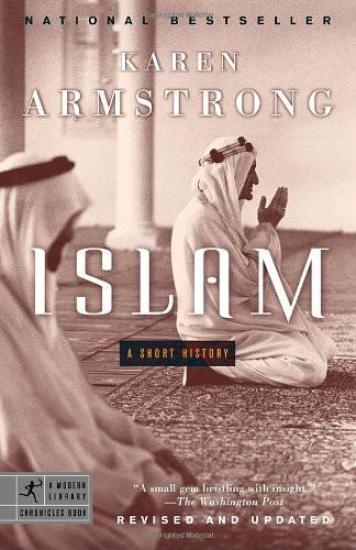
Rating: ***
Tags: Non Fiction, Lang:en
Publisher: Modern Library
Published: December 17, 2007
Added: September 7, 2019
Modified: September 7, 2019
Summary
Sigit Purwadi's
Library - No religion in the modern world
is as feared and misunderstood as Islam. It haunts the
popular Western imagination as an extreme faith that promotes
authoritarian government, female oppression, civil war, and
terrorism. Karen Armstrong's short history offers a vital
corrective to this narrow view. The distillation of years of
thinking and writing about Islam, it demonstrates that the
world's fastest-growing faith is a much richer and more
complex phenomenon than its modern fundamentalist strain
might suggest.
Islam: A Short History begins with the flight of
Muhammad and his family from Medina in the seventh century
and the subsequent founding of the first mosques. It recounts
the origins of the split between Shii and Sunni Muslims, and
the emergence of Sufi mysticism; the spread of Islam
throughout North Africa, the Levant, and Asia; the shattering
effect on the Muslim world of the Crusades; the flowering of
imperial Islam in the fourteenth and fifteenth centuries into
the world's greatest and most sophisticated power; and the
origins and impact of revolutionary Islam. It concludes with
an assessment of Islam today and its challenges. With this brilliant book, Karen Armstrong issues a
forceful challenge to those who hold the view that the West
and Islam are civilizations set on a collision course. It is
also a model of authority, elegance, and economy.** The picture of Islam as a violent, backward, and insular
tradition should be laid to rest, says Karen Armstrong,
bestselling author of
Muhammad and
A History of God. Delving deep into Islamic history,
Armstrong sketches the arc of a story that begins with the
stirring of revelation in an Arab businessman named Muhammad.
His concern with the poor who were being left behind in the
blush of his society's new prosperity sets the tone for the
tale of a culture that values community as a manifestation of
God. Muhammad's ideas catch fire, quickly blossoming into a
political empire. As the empire expands and the once
fractured Arabs subdue and overtake the vast Persian domain,
the story of a community becomes a panoramic drama. With
great dexterity, Armstrong narrates the Sunni-Shi'ite schism,
the rise of Persian influence, the clashes with Western
crusaders and Mongolian conquerors, and the spiritual
explorations that traced the route to God. Armstrong brings
us through the debacle of European colonialism right up to
the present day, putting Islamic fundamentalism into context
as part of a worldwide phenomenon.
Islam: A Short History , like Bruce Lawrence's
Shattering the Myth and Mark Huband's
Warriors of the Prophet , introduces us to a faith
that beckons like a minaret to those who dare to venture
beyond the headlines.
--Brian Bruya
Readers seeking a quick but thoughtful introduction to
Islam will want to peruse Armstrong's latest offering. In her
hallmark stylish and accessible prose, the author of A
History of God takes readers from the sixth-century days of
the Prophet Muhammad to the present. Armstrong writes about
the revelations Muhammad received, and explains that the
Qur'an earned its name (which means recitation) because most
of Muhammad's followers were illiterate and learned his
teachings not from reading them but hearing them proclaimed
aloud. Throughout the book, Armstrong traces what she sees as
Islam's emphasis on right living (? la Judaism) over right
belief (? la Christianity). Armstrong is at her most
passionate when discussing Islam in the modern world. She
explains antagonisms between Iraqi Muslims and Syrian
Muslims, and discusses the devastating consequences of
modernization on the Islamic world. Unlike Europe, which
modernized gradually over centuries, the Islamic world had
modernity thrust upon it in an exploitative manner. The
Islamic countries, Armstrong argues, have been "reduced to a
dependent bloc by the European powers." Armstrong also
rehearses some basics about Islamic fundamentalism in a
section that will be familiar to anyone who has read her
recent study, The Battle for God. A useful time line and a
guide to the "Key Figures in the History of Islam" complete
this strong, brisk survey of 1,500 years of Islamic history.
(Aug.)
Amazon.com Review
From Publishers Weekly
Copyright 2000 Reed Business Information,
Inc.